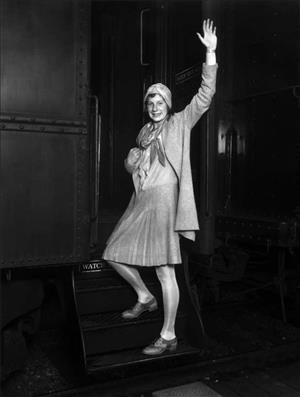On August 8, 1932, swimmer Helene Madison (1913-1970) wins the first of three gold medals that she will be awarded at the 1932 Summer Olympics in Los Angeles. The 19-year-old sports sensation has already broken numerous freestyle swimming records and won three consecutive national championships in amateur swimming. More than century after her birth, Madison will remain the only Washingtonian to win three gold medals in a single Olympics.
Her Meteoric Rise
Madison had been a Northwest swimming sensation since 1929, when at the age of 15 she broke the state record for the women's 100-yard freestyle, and then quickly followed that up by breaking the Pacific Coast record. By 1932, she owned 23 world records and had won every freestyle event at the U.S. Women’s Nationals three years in a row.
Madison learned her competitive swimming techniques under the tutelage of Ray Daughters (1905-1972), an instructor at the Crystal Natatorium in Seattle's Belltown neighborhood. When the Washington Athletic Club opened in 1930, Daughters got a job there and Madison continued to hone her skills at the new facility.
Soon after arriving in Los Angeles for the 1932 Summer Olympics, Daughters made a bold prediction: "I expect her to carry two Olympic championships back to Seattle, and in that short statement I give my idea of everything" (The Seattle Times, July 31, 1932).
The First Medal
Madison won her first qualifying heat in the women's 100-meter freestyle with a time of 1 minute and 8.9 seconds, slightly faster than the Olympic record of 1 minute 11 seconds. In her semi-final heat, she clocked in at 1 minute 9 seconds. In each of her races, Madison got off to a fast start to build up a lead without sprinting near the end of the race. That strategy was changed for the final race.
On August 8, Madison went up against 14-year-old Willy Den Ouden (1918-1997) from Holland and U.S. swimmers Josephine McKim (1910-1992) and Eleanor Garatti Saville (1909-1998) for the championship. When the gun was fired, Helene hit the water and held her pace and strength for the first 50 meters. Then she kicked into high gear and turned a one-foot advantage into a three-foot lead.
Madison handily won the race with a time of 1 minute 6.8 seconds, more than four seconds faster than the Olympic record. She missed beating the world record (her own) by just 2.2 seconds. After being awarded the gold medal, she told reporters, "Tell the people in Seattle how happy I am ... Gosh, I am tingling all over!" (The Seattle Times, August 9, 1932).
Two More
On August 12, Madison was awarded her second gold medal, for winning the 400-meter relay race along with McKim, Saville, and Helen Johns (b. 1914). Their winning time was 4 minutes and 38 seconds which beat the previous world record by 9.6 seconds. The silver and bronze medals went to teams from the Netherlands and Great Britain respectively.
The day before her success in the relay, Madison qualified -- despite having a blistered foot -- for the women's 400-meter freestyle race by winning the preliminary heat with a time of 5 minutes 44.5 seconds. On August 12, she won the semi-final round with a time of 5 minutes 48.7 seconds. The championship race was held before a capacity crowd on August 13.
The race was close, and Madison beat out U.S. swimmer Lenore Kight (1911-2000) by a tenth of second, with a gold-winning time of 5 minutes 28.5 seconds. Both women were far ahead of the other three swimmers, and both broke Madison's existing world record of 5 minutes 31 seconds. South African swimmer Jenny Makaal (1913-2002) took the bronze with a time of 5 minutes 47.3 seconds.
Queen Helene
When Helene Madison returned home to Seattle on August 26, she received a hero's welcome. Her arrival coincided with the finale of Fleet Week celebrations, and the city was already bubbling with fun and festivity. Her appearance in the grand parade up Second Avenue unleashed a snowstorm of colored paper and confetti unlike any other parade in the city's past. That evening, she was the guest of honor at the Naval Ball at the Olympic Hotel.
When she was in Los Angeles Madison had hinted that she would leave amateur swimming, hoping to parlay her fame into a Hollywood career. On August 28, she gave a swimming demonstration at the Playland amusement park, where she also received a free car as a gift from the Washington Athletic Club and other Seattle friends. This payment put an end to her amateur status, and she soon left for Hollywood.
Sadly, her dreams of becoming a screen star didn't pan out and she returned to Seattle, where jobs of any kind were lacking because of the Great Depression. In the 1940s, she opened a swimming school at the Moore Hotel pool, but illnesses and two failed marriages left her broke during her later years. In 1970 she died in a basement apartment that she shared with her cat and parakeet near Green Lake.

